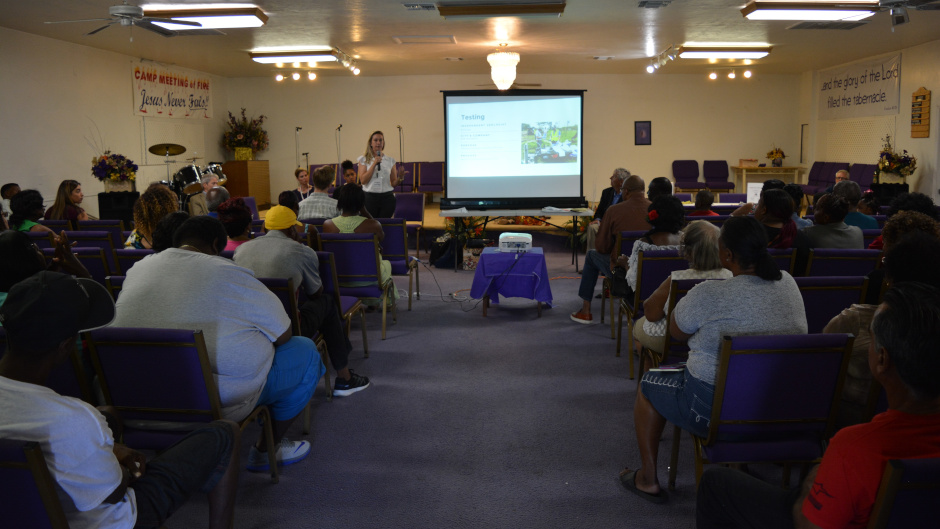Last summer, a group of students from Miami Law's Environmental Justice Clinic traveled to the predominantly African-American neighborhood of Dunbar on Florida’s west coast. There they met with residents concerned about toxins on a site in the heart of their community recently brought to light through a local investigative reporter.
Fort Myers and Decades of Dumping Sludge Waste
Starting in the 1960s, the City of Fort Myers dumped lime sludge waste from the city's wastewater treatment plant on an open lot. The dumping continued for decades. The sludge contained arsenic, yet the city never notified the Dunbar residents despite the fact that testing in 2007 and 2008 showed that the dangerous carcinogen still contaminated the ground and groundwater. Nor did the city attempt to clean the site, post signs or fence the property.
Previous Experience Uncovering Toxic Dumping
The Environmental Justice Clinic built its reputation on just this sort of ecological cataclysm — securing justice for marginalized populations impacted by environmental hazards — having previously uncovered dumping of poison ash in Miami's Coconut Grove neighborhood.
On their first visit to Dunbar, the clinic students met with community leaders, activists, organizers, commissioners, and political stakeholders. They went door-to-door gathering information from generations of Dunbar dwellers.
"The community was engaged," says EJC Fellow Abigail Fleming, who was part of the initial on-the-ground team. "They seemed horrified about what they had seen on the news. Everyone was willing to speak and share their story."
After all, children from families who had lived in the area for generations had grown up splashing in the pools of intensely aquamarine water and horsing around in the soft, orange muck, never imagining the risk contained in the Kodachrome setting.
Clinic Students Assist with Investigation, Organize Committee
As the case builds, the clinic students have continued to work in support of a gathering storm by providing legal research and fact investigations for the attorneys who have signed on to file the case. They organized a town hall and assisted with the formation of a steering committee, named Dunbar Connect, despite the almost 3-hour drive to the Fort Myers suburb.
"The creation of the steering committee is integral to ensure the community's needs, wants, and voices are always being heard and at the forefront of our actions," EJC intern Andrea Ezell.
Class Action Law Suit Filed
In March 2018, the local attorneys, buttressed by the EJC, filed a class action complaint against the City of Fort Myers, Mayor Randall P. Henderson, Jr., and City Manager Saeed Kazemi in the United States District Court for the Middle District of Florida.
The suit alleges that Fort Myers, the Mayor, and City Manager violated both federal and state laws. The residents are asking the court for an order requiring the removal and cleanup of contaminated soils and groundwater for the lot the city owns and surrounding private properties befouled by the city's actions.
They also seek compensation for real property damage, loss of use and enjoyment of their properties, diminution in property value, and for annoyance, discomfort, and inconvenience. The complaint also requests that the court establish a medical monitoring program for early detection and mitigation of diseases associated with the exposure to the deadly contaminants.
"The program will not only give health care access to a much-deserved community but provide peace of mind to those exposed," says Fleming.
“The EJC's work in communities such as Dunbar addresses incredibly critical issues of health and equity, amplifying the voices of those historically and continuously ignored and disenfranchised from decision-making processes,” says Natalie Barefoot, practitioner-in-residence for the clinic.
"I have never doubted that the people of Dunbar can be an example for other similar cases," says EJC intern Dante Nugroho. "Even a small group of thoughtful and committed citizens can trigger change. Solutions to one problem can be a solution for all."
More on the Environmental Justice Clinic
More on all Miami Law Clinics

